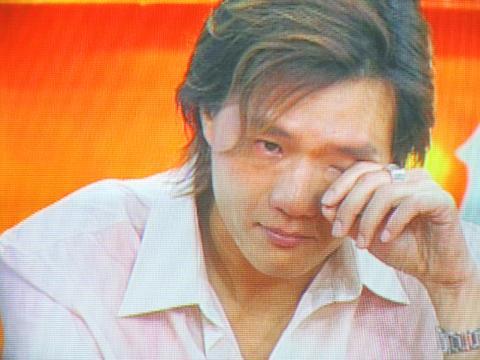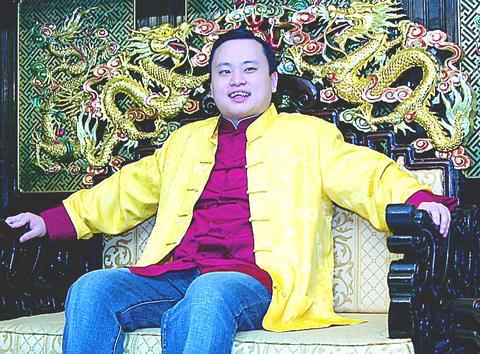Taiwan's veteran Mando-pop diva Chang Hui-mei (
"I was performing a concert in Chongqing at the time of the announcement and everyone, whether they knew each other or not, was hugging each other. I was truly honored to be there on stage with everyone shouting, `We got the Olympics!'"

PHOTO: TAIPEI TIMES
When the topic of her latest encounter with Chinese nationalist protesters in Hangzhou was raised, the interviewer asked whether the event had left her with any lasting impressions and whether she had learned that "there are things you can do and things you can't do?"

PHOTO: TAIPEI TIMES
She replied: "Of course. ? I know that my influence goes beyond those around me to many more people, so I need to be more cautious. I know what I should do." Indeed, if her albums don't sell any more in Taiwan, better to pave the way for a smooth future in China.
Back in Taiwan, last weekend at the Formoz Festival it wasn't performers facing the heat from the powers that be, but rather the other way round. In a manifestation of the punk spirit in Taiwan, the nation's President Chen Shui-bian (
Meanwhile in Hong Kong over the weekend, Jay Chou (
Last week Pop Stop also had a random encounter deep in the mountains of Hsinchu County with Chiang Wei-wen (
Last week Pop Stop reported on Alex To's (
And in China, authorities have nixed one of the songs on the album for lyrics that translate like this: "Where'd you learn that? Touching me so I get so swollen ? I just want it all, and if you can't do it for me, I won't love you anymore."

Towering high above Taiwan’s capital city at 508 meters, Taipei 101 dominates the skyline. The earthquake-proof skyscraper of steel and glass has captured the imagination of professional rock climber Alex Honnold for more than a decade. Tomorrow morning, he will climb it in his signature free solo style — without ropes or protective equipment. And Netflix will broadcast it — live. The event’s announcement has drawn both excitement and trepidation, as well as some concerns over the ethical implications of attempting such a high-risk endeavor on live broadcast. Many have questioned Honnold’s desire to continues his free-solo climbs now that he’s a

The 2018 nine-in-one local elections were a wild ride that no one saw coming. Entering that year, the Chinese Nationalist Party (KMT) was demoralized and in disarray — and fearing an existential crisis. By the end of the year, the party was riding high and swept most of the country in a landslide, including toppling the Democratic Progressive Party (DPP) in their Kaohsiung stronghold. Could something like that happen again on the DPP side in this year’s nine-in-one elections? The short answer is not exactly; the conditions were very specific. However, it does illustrate how swiftly every assumption early in an

Francis William White, an Englishman who late in the 1860s served as Commissioner of the Imperial Customs Service in Tainan, published the tale of a jaunt he took one winter in 1868: A visit to the interior of south Formosa (1870). White’s journey took him into the mountains, where he mused on the difficult terrain and the ease with which his little group could be ambushed in the crags and dense vegetation. At one point he stays at the house of a local near a stream on the border of indigenous territory: “Their matchlocks, which were kept in excellent order,

Jan. 19 to Jan. 25 In 1933, an all-star team of musicians and lyricists began shaping a new sound. The person who brought them together was Chen Chun-yu (陳君玉), head of Columbia Records’ arts department. Tasked with creating Taiwanese “pop music,” they released hit after hit that year, with Chen contributing lyrics to several of the songs himself. Many figures from that group, including composer Teng Yu-hsien (鄧雨賢), vocalist Chun-chun (純純, Sun-sun in Taiwanese) and lyricist Lee Lin-chiu (李臨秋) remain well-known today, particularly for the famous classic Longing for the Spring Breeze (望春風). Chen, however, is not a name